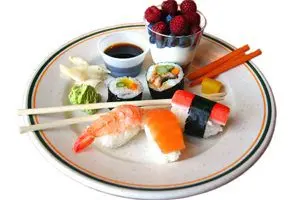Contents
The Japanese diet for 7 days is the shortest version of the weight loss technique of the same name: there are also schemes designed for 13 and 14 days. The main advantage of the seven-day regimen is that impressive results can be achieved in such a short period of time. The average weight loss is 3-6 kg.
However, the Japanese diet of just one week is a serious test of willpower. This weight loss system is not without reason considered one of the most rigid. Therefore, if there is no, first of all, psychological readiness, then you should not go on such a diet.
The essence of the Japanese diet for 7 days

Every person who has decided to lose weight and has chosen the Japanese diet to achieve this goal needs to figure out what exactly causes weight loss.
First, the diet menu is very strict. There is practically no breakfast, and the number of meals is limited to three. The Japanese diet does not involve snacking.
Secondly, the diet is very low in calories. On average, a person receives about 1100 kcal per day, and sometimes only 700 kcal. In addition, the products are selected so that certain chemical reactions are launched in the body, which are aimed at burning fat.
Thirdly, during the week a person eats almost exclusively protein foods, which are the main focus. Carbohydrates and fats, of course, are present, but in very limited quantities. The fact that the menu is not devoid of fiber enhances the effect of losing weight.
If these arguments seem convincing to you, then you should familiarize yourself with the basic rules of the Japanese seven-day diet.
Japanese diet rules for 7 days

It is not possible to adjust the sequence specified in the menu at your own discretion. That is, the Tuesday diet cannot be replaced by the set of products that is intended for Thursday, etc.
Dishes on the menu of one day cannot be interchanged: for example, it is forbidden to eat for dinner those foods that rely on lunch.
Coffee or green tea, which is drunk for breakfast, should be without added sugar or milk.
It is highly undesirable to salt food during cooking. However, if it is very difficult to eat food without salt, then a small amount of it in dishes is acceptable.
The drinking regime must be strictly observed. Drink at least 2 liters of pure water without gas per day. This volume does not include coffee, tea and kefir.
Drink a glass of warm water every morning on an empty stomach. Also, water must be drunk half an hour before a meal and two hours after a meal.
You need to enter the diet correctly, for which you should start preparing the body in advance. At least a week in advance, you must stop eating fried, fatty, spicy and too salty foods. Preference should be given to boiled rice, lean meat, vegetables and fruits, as well as dairy products.
You also need to get out of the diet gradually. That is, after 7 days, you can not immediately return to the menu that the person adhered to earlier. Portions should be increased gradually. It will also be possible to smoothly begin to introduce carbohydrate and fatty foods.
To consolidate the result, it is necessary to adhere to proper nutrition and limit the calorie content of dishes in the future.
Products are allowed to boil and bake, although even roasting is possible. But this method of heat treatment should not be abused.
Breakfast, lunch and dinner should be every day at the same time, you can not skip them.
All food should be chewed especially carefully. This will help to ensure that the products are better absorbed and digested, which is extremely necessary with such a low calorie content of dishes.
A glass of water without gas allows you to muffle the feeling of hunger.
So that the diet does not become torture for a losing weight, you can bring some oriental flavor to it. For example, eat all food with wooden chopsticks. While eating, you can listen to oriental music or watch Asian films. This will make the process of losing weight more interesting and unusual, especially since the psychological attitude remains a very important element in any diet.
How to choose the right products?

The breakfast of the Japanese diet consists mainly of coffee, because it is this invigorating drink that allows you to start and speed up your metabolism. A cup of cafe does not harm people on the background of full health, even if they use it on an empty stomach (after drinking a glass of warm water). However, the most important condition is that the coffee must be of high quality. It is unacceptable to use 3 in 1 coffee or low-grade powdered drink during the diet. If a person cannot drink natural coffee, then it is allowed to replace it with high-quality green tea.
Cabbage is one of the staple foods in the Japanese diet. Besides the fact that it has a low calorie content, the body spends more energy on its digestion than it receives. Cabbage is also a valuable source of fiber, which allows the intestines to function normally. It is important to choose medium-sized forks so that they do not have rot or mold. The same goes for choosing carrots.
Chicken and beef, which are used in the menu of the Japanese diet, must be fresh. It is best to take not frozen, but chilled meat. The product should have a low calorie content, so chicken breast and lean beef fillet are used for cooking.
Fish also needs to be chosen low-fat, but at the same time it should be sea, not river. For example, fillets of hake, cod, blue whiting and sea bass can be used. Suitable for steaming or in the oven haddock, pollock and saffron cod. In addition to the fact that these inhabitants of the sea have a low calorie content, they are also 100% absorbed by the body.
Even to compile the menu, you will need chicken eggs, tomato juice, olive oil, low-fat cheese, kefir and fruits. You can use almost any fruit except bananas and grapes.

First day:
Breakfast: Coffee
Lunch: A glass of tomato juice, 2 boiled eggs, Chinese cabbage salad with olive oil
Dinner: Steamed fish (250 g).
Second day:
Breakfast: Rye cracker, coffee.
Lunch: Boiled fish (250 g), cabbage salad with olive oil.
Dinner: Boiled beef (100 g), a glass of low-fat kefir.
The third day:
Breakfast: Rye cracker, coffee.
Lunch: Fried zucchini in unlimited quantities.
Dinner: Boiled beef (200 g), boiled chicken eggs (2 pcs.), Cabbage salad.
Fourth day:
Breakfast: Coffee
Lunch: Boiled egg, cheese (50 g), boiled carrots.
Dinner: Two apples.
Fifth day:
Breakfast: Boiled carrots with lemon juice.
Lunch: Half a kilo of boiled chicken breast, coleslaw with carrots, seasoned with olive oil.
Dinner: Two apples.
Sixth day:
Breakfast: Coffee
Lunch: Steam fish (200 g), tomato juice.
Dinner: Cabbage salad, two boiled eggs.
Seventh day:
Breakfast: Green tea.
Lunch: Boiled beef (200 g), pear.
Dinner: Steamed fish (200 g), a glass of kefir.
Benefits of the Japanese diet for 7 days

Like any other weight loss technique, the Japanese diet has its advantages, including:
In a week, you can lose up to 6 kg of excess weight, which is a very good result.
Many people, after a seven-day restriction on the menu, get used to this moderate type of food and switch to it in the future (meaning small portion sizes). Adaptation of the body to food restrictions occurs quite quickly.
In addition to getting rid of extra pounds, the diet allows you to remove toxins from the body and normalize metabolism.
The effect of the Japanese diet persists for a long time, but on condition that the person continues to eat properly.
This diet is suitable for even the most modest budget, as the products on which it is based are affordable. In addition, they can be found on store shelves all year round.
Disadvantages of the Japanese diet for 7 days

The Japanese diet for 7 days also has disadvantages, among which the following points can be highlighted:
Since the calorie content of the daily menu is very low, a person will experience hunger, especially in the first days after entering the diet. This can cause weakness, drowsiness, and sometimes even incoordination. In conditions close to fainting, the diet should be abandoned.
The diet has certain contraindications, including cardiovascular diseases, gastritis, peptic ulcer of the stomach and duodenum, diseases of the urinary system, pregnancy and lactation.
The diet involves eating 3 meals a day, and there are no snacks in it. Most nutritionists consider this a huge disadvantage and insist that the number of approaches to the table per day should be at least five. Otherwise, the body begins to experience severe stress.
The results of the Japanese diet for 7 days

The seven-day Japanese diet is a very effective method of losing weight. Thanks to it, you can get rid of, on average, 5 extra pounds, and sometimes even more. The final result depends on the initial weight of the person, as well as on the individual characteristics of the organism. There is evidence that in a week some people lost up to 7-9 kg. At the same time, their initial weight was very impressive.
In addition to the fact that the diet allows you to quickly eliminate excess weight, the result will be maintained for a long time. The only condition is only the correct way out of the method of losing weight and the observance of the principle of moderation in food in the future.
Elvira. During pregnancy, I gained 20 extra pounds. Ten of them left immediately after giving birth, and another ten simply did not move. I decided to try the Japanese diet and did not regret it. I got rid of 5 kg in just a week and voila – the weight did not return. Three months have already passed, now I am waiting for another two months to pass, and again I will try to correct my figure. Yes, the diet was difficult for me, but it did not cause any side effects.
Elena. A friend advised me this diet, as I gained 10 kg over the winter. I didn’t really believe in a positive result, but I tried it and was not disappointed. In just a week I got rid of 4,8 kg. I will lose weight more and recommend this diet to everyone. Difficult, but possible!
Alina. This is not even a diet, but a real lifeline for women striving for an ideal figure. I have a hard time limiting my food intake on normal days. But once every 3 months I use the seven-day Japanese diet and keep my weight under control. So I live: I gained 4-5 kg, I lose weight for a week. Weight does not return for a long time – about 3 months, provided that I am inclined to be overweight and eat what I want. I advise you to try all the girls with a similar problem.









